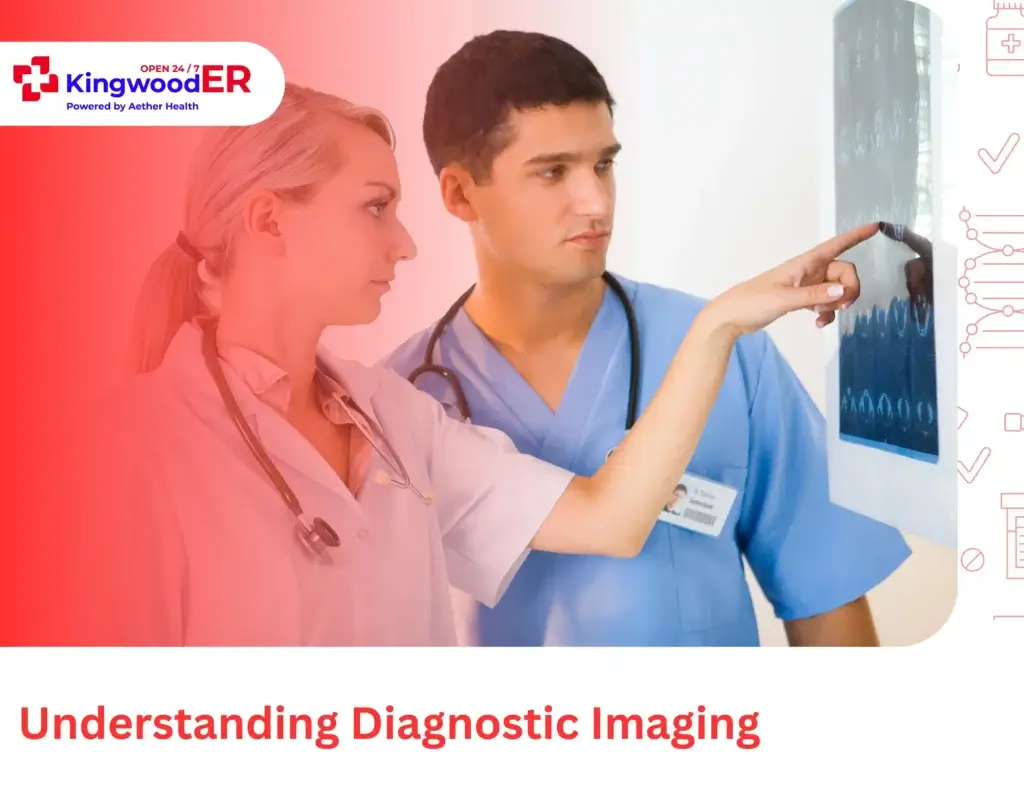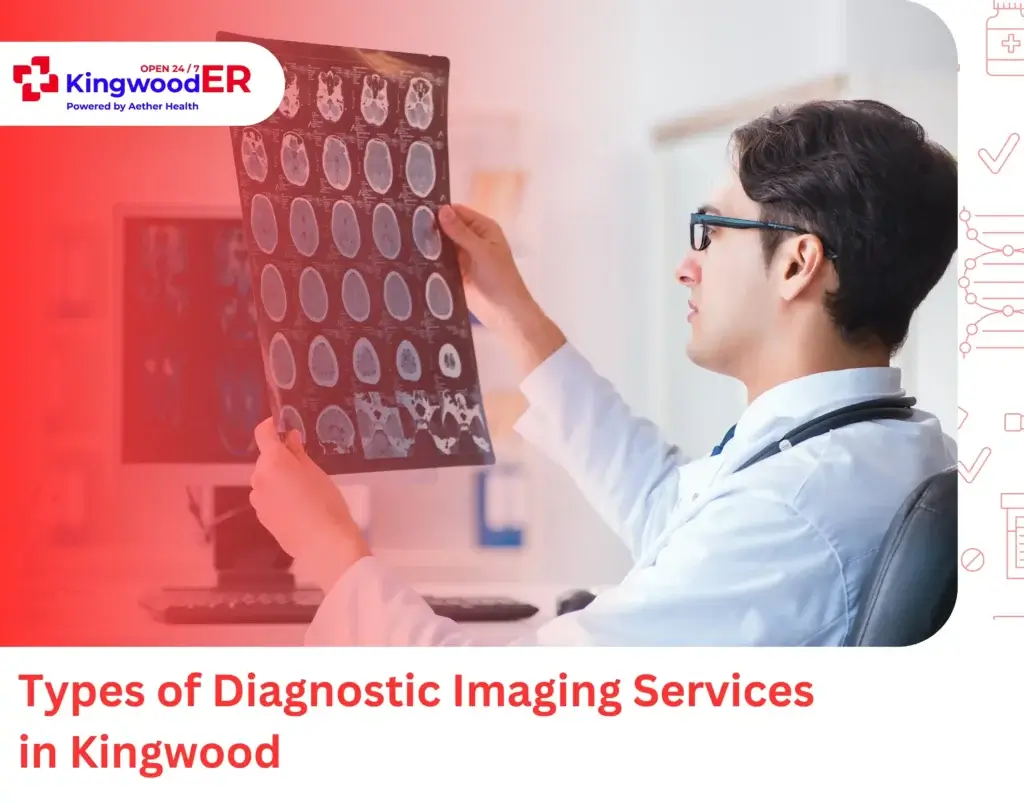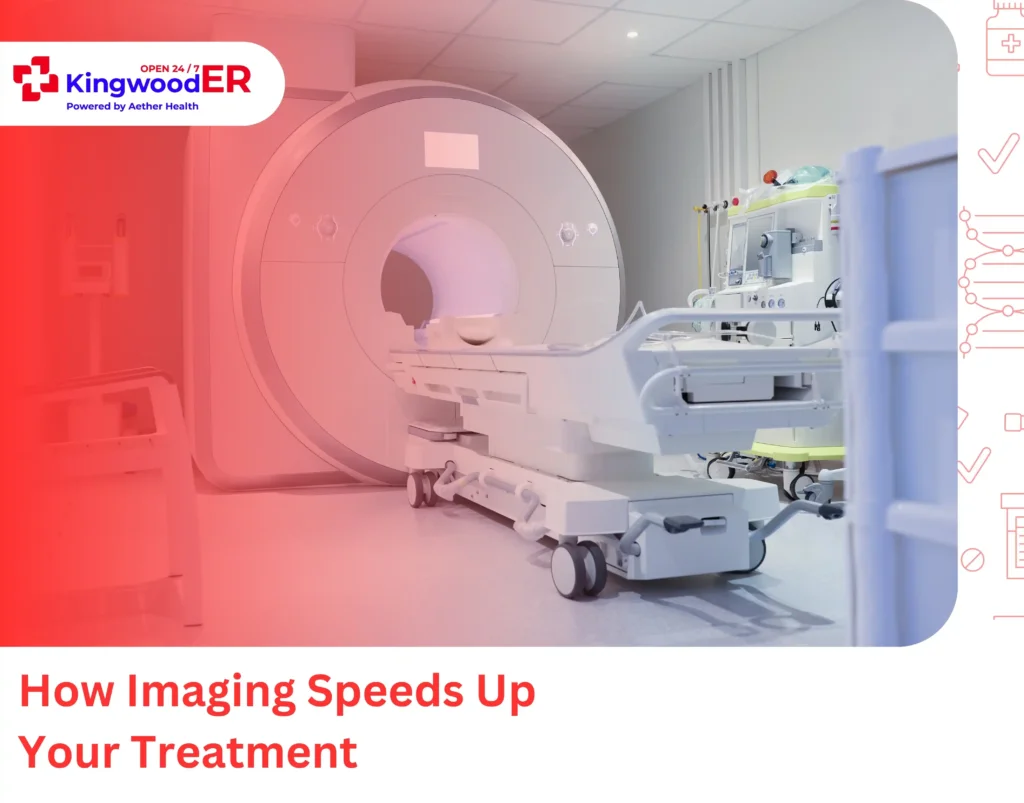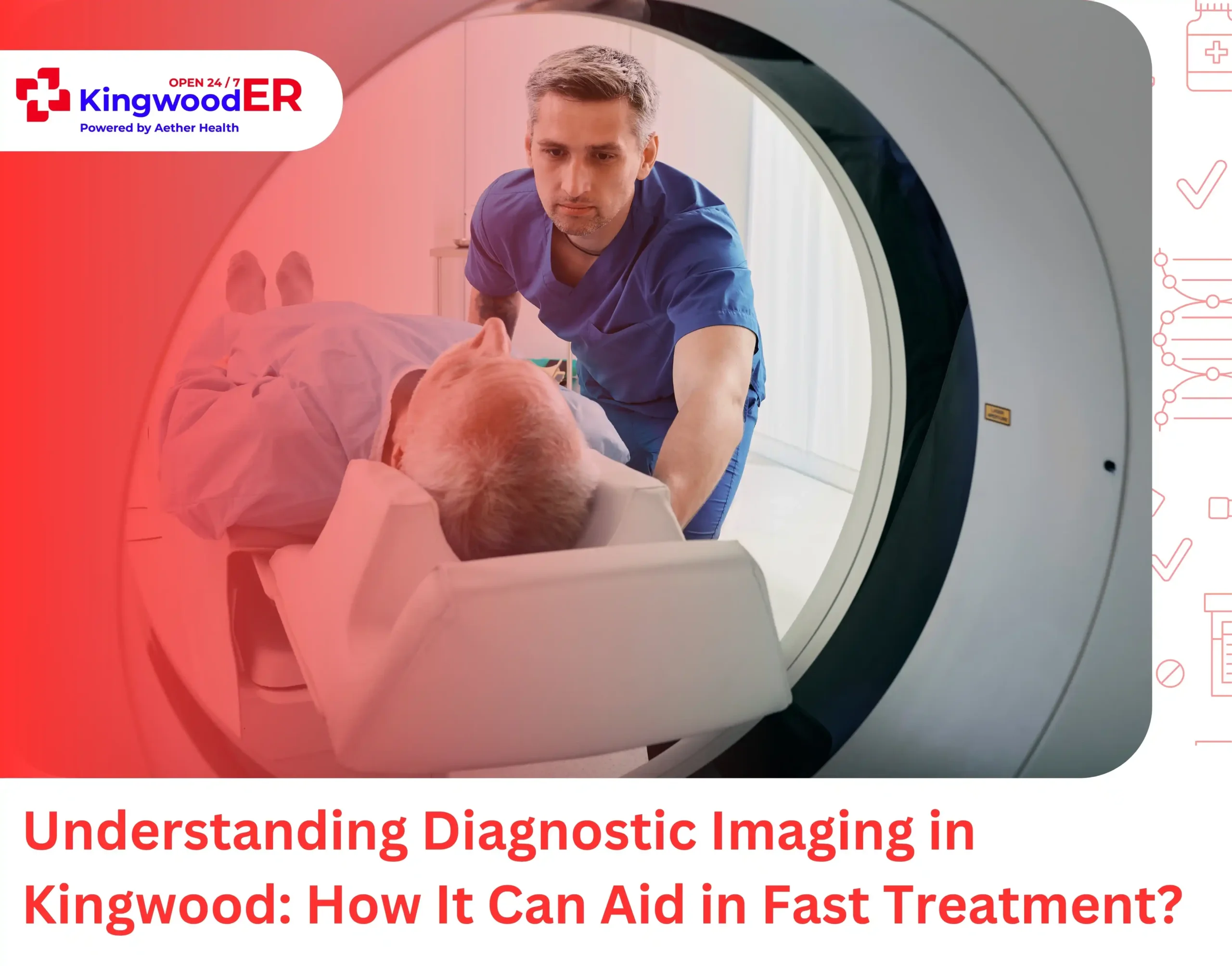For patients, understanding diagnostic imaging is crucial when symptoms alone can’t tell the full story. These advanced scans provide critical answers within minutes to hours, detecting everything from hairline fractures and internal bleeding to early signs of cancer and heart disease.
At Kingwood ER, we’ve equipped our imaging center with every diagnostic tool your emergency might require, from rapid CT scans and MRIs to specialized ultrasounds, digital mammography, and DEXA scans. These imaging tools are backed by our expert physicians who diagnose and treat conditions faster and more precisely than ever before.
Understanding Diagnostic Imaging

Diagnostic imaging uses different technologies to capture detailed pictures of your body’s internal structures. Some machines use X-rays, others harness magnetic fields or sound waves, but all serve one purpose: to help our physicians see exactly what’s causing your symptoms.
Each imaging type has its own strengths, whether it’s viewing bones, soft tissues, or blood flow. At Kingwood ER, we choose the most appropriate scan based on your symptoms to get you answers quickly. Here’re the imaging services that our facility offers:
Types of Diagnostic Imaging Services in Kingwood

Each of our imaging services is designed to provide specific insights for different medical conditions. Here’s an overview of all the imaging services we offer at Kingwood ER.
MRI (Magnetic Resonance Imaging)
MRI scans excel at revealing soft tissue problems that other scans might miss. Using powerful magnets rather than radiation, these detailed scans help us evaluate everything from brain injuries and spinal cord damage to torn ligaments and organ abnormalities. While MRIs take longer than other imaging methods, they provide unmatched detail for certain conditions.
CT Scan (Computerized Tomography)
CT scans provide rapid and detailed views of the organs being scanned. They are especially valuable in emergencies to detect strokes, internal bleeding, tumors, and other serious injuries within minutes. By creating cross-sectional images, CT scans help our physicians spot problems that traditional X-rays might miss.
Digital X-Ray
The fastest way to examine bones and joints, digital X-rays provide immediate images of fractures, dislocations, and chest conditions. Unlike MRIs, x-rays use radiation to capture images, similar to taking a photograph through your body. The amount of radiation is minimal, and the speed and clarity of results make X-rays invaluable for emergency diagnosis.
Ultrasound
Ultrasound gives us real-time views inside your body using safe sound waves instead of radiation. This versatile technology helps diagnose everything from gallstones and appendicitis to pregnancy complications. The ability to see organs in motion makes ultrasound especially valuable for examining blood flow and heart function during emergencies.
Digital Mammography
Digital mammography is a specialized imaging exam used to detect breast cancer. It is particularly effective for routine breast cancer screenings in women to identify abnormalities at their earliest stages. Early detection through mammography helps us provide timely treatment with better outcomes.
DEXA Scan
DEXA scans measure bone strength with pinpoint accuracy and can detect osteoporosis before fractures occur. These scans create detailed maps of your bone density with very low radiation doses, which lets us assess fracture risk and monitor treatment results.
Nuclear Medicine
Nuclear medicine shows us how organs function, not just their structure. Small amounts of radioactive materials tracked through your body can reveal problems like thyroid disorders, heart disease, and cancer in their earliest stages. These scans detect disease patterns that other imaging methods might miss.
PET Scan
PET scans combine detailed CT images with specialized tracers to show both the location and activity of diseases. This dual approach excels in cancer diagnosis and treatment planning. It reveals not just where abnormal growths are, but how actively they’re spreading.
Safety in Diagnostic Imaging
At Kingwood ER, we prioritize your safety while getting the answers you need. Our modern diagnostic imaging services use the lowest effective radiation doses possible. Many scans, like MRI and ultrasound, use no radiation at all. We protect you through:
- Precise calibration of equipment for each patient
- Lead shielding when appropriate
- Selection of radiation-free alternatives when possible
- Strict adherence to national safety standards
Each scan is carefully chosen to maximize diagnostic value while minimizing any risks.
How Imaging Speeds Up Your Treatment

Quick diagnosis through imaging directly impacts your treatment. Here’s how:
- Immediate Intervention: Instead of waiting hours or days for answers, our physicians see exactly what’s wrong within minutes. A CT scan can instantly reveal if chest pain stems from a blood clot or heart problem, so we can start the right treatment immediately.
- Precise Treatment: Advanced imaging guides our procedures with pinpoint accuracy. When treating internal bleeding or placing emergency stents, real-time imaging ensures precise intervention.
- Treatment Monitoring: Imaging lets us track how well treatments are working in real-time. If a treatment isn’t providing the expected results, we can adjust our approach immediately rather than waiting for symptoms to change.
- Avoiding Unnecessary Procedures: Clear images help us rule out serious conditions quickly, preventing unnecessary treatments and getting you the specific care you need faster.
Key Takeaway
Fast and accurate diagnosis through advanced imaging can make the difference in your emergency care. At Kingwood ER, we combine state-of-the-art technology with emergency medicine expertise to get you answers when you need them most.
Our emergency facility stands ready 24/7 for everything from urgent X-rays to complex CT scans. If you or someone close to you needs diagnostic imaging services in Kingwood, don’t hesitate to call or visit us directly to get on the path to recovery.
FAQs
How do I prepare for imaging?
For imaging preparation, follow your healthcare provider’s instructions and remove metal objects. Fasting and hydration requirements may vary by procedure.
What is the process of diagnostic radiography?
During diagnostic radiography, the patient is positioned, and X-rays are used to capture internal images. A radiologist then reviews these images for diagnosis.
Do I need to fast for imaging?
Not all imaging requires fasting. Specific procedures like some CT and MRI scans might need it. Always check with your healthcare provider for detailed instructions.




